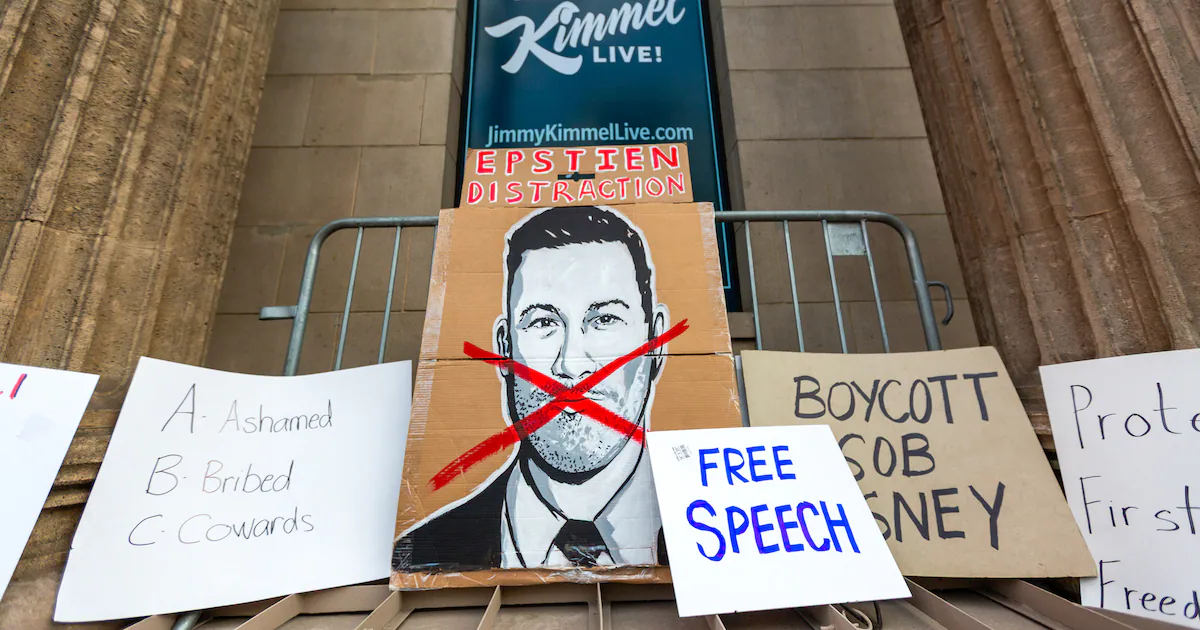
Few pieces of political writing are as widely misunderstood, misinterpreted and falsely disseminated as the First Amendment to the U.S. Constitution.
For years, whenever a public figure has faced backlash and consequences for social media posts, public comments or even private statements that offended people, self-proclaimed defenders of free speech would insist that the First Amendment rights of their fellow Americans were being violated. Their argument was flawed because a groundswell of backlash over bad behavior — resulting in, say, a private company cutting ties with a controversial figure — is about the market, not about the government.
But I have good news for free speech defenders and cancel culture abolitionists: a clear-cut case of actual First Amendment infringement — the federal government abridging the freedom of speech of an individual and his employer — is playing out right now. The individual is Jimmy Kimmel, whose late-night talk show has been pulled indefinitely from ABC’s schedule, following threats from Federal Communications Commission Chairman Brendan Carr.
Those threats were prompted by comments Kimmel made in his opening monologue on “Jimmy Kimmel Live!” Monday night. “We hit some new lows over the weekend,” he said, “with the MAGA gang desperately trying to characterize this kid who murdered Charlie Kirk as anything other than one of them and doing everything they can to score political points from it.”
Wherever you stand on the accuracy of Kimmel’s comments, he was well within his rights to make them. It should also be noted that his remarks were in no way disrespectful to Kirk himself, to whose family the host had expressed condolences after his death last week. But Carr apparently disagreed. While on right-wing influencer Benny Johnson’s podcast on Wednesday, Carr openly threatened ABC with investigation and retaliation by the FCC, using the clichéd language of a bad gangster movie.
“We can do this the easy way or the hard way,” Carr sneered. “These companies can find ways to change conduct and take action, frankly, on Kimmel or there’s going to be additional work for the FCC ahead.” He also suggested that “these licensed broadcasters themselves push back,” because such broadcasters “are running the possibility of fines or license revocation from the FCC.”
The message couldn’t have been clearer — nor the signs that it had been received. Within hours, Nexstar, the largest TV station owner in the U.S., announced that it would preempt Jimmy Kimmel Live! “for the foreseeable future.” Sinclair Broadcasting, a similarly sprawling owner of local affiliates known for its conservative local news editorials, quickly followed suit, leading ABC’s executives to pull the plug on Kimmel, at least for the time being.
Following what happened to Stephen Colbert in July, this means two late-night hosts — both openly critical of President Donald Trump and his administration — have been removed from major networks within less than 90 days. But what makes the Kimmel affair different, and much more chilling, than the dismissal of Colbert is the directness and obviousness of the federal government’s interference. The motives and power plays behind the cancellation of The Late Show With Stephen Colbert were muddied, buried in backroom and boardroom deals and compromises, allowing CBS to insist that the show’s conclusion was not about Colbert’s anti-Trump views, but financial concerns.
There is no such opacity here. The head of the FCC threatened individual broadcasters and the ABC network with fines and revocations if Kimmel continued to air. Within hours — in what could only be described as a spineless and cowardly move — the network and those broadcasters took the bait and silenced him. Once all parties had acquiesced, the head of the FCC joined the president in taking a victory lap.
And why wouldn’t they? They’d gotten what is presumably the real goal: removing one more anti-Trump voice from the airwaves. That this is happening in the name of Kirk — someone whom the same people cheering Kimmel’s removal have spent the last week insisting was a warrior for free speech — is hypocrisy of the highest order.
What the Kimmel and Colbert cancellations have in common is obvious conflicts of interest. The Late Show with Stephen Colbert was pulled two days after Skydance CEO David Ellison and his lawyer met with Carr and an FCC lawyer to discuss the company’s pending merger with Paramount, the parent company of Colbert’s network, CBS. This came on the heels of the network’s $16 million settlement for a stunningly meritless lawsuit that President Trump filed against CBS News. Similarly, ABC handed Trump $15 million to settle a frivolous lawsuit of its own last year — and hey, whaddya know, Nexstar, the first company to buckle under Carr’s browbeating, is in the midst of a merger that will require FCC approval.
It’s all breathtakingly corrupt, even by the standards of this administration. After Kimmel’s removal, Carr told Fox News’ Sean Hannity that the FCC would enforce “the public interest obligation,” but what we are really witnessing is a surge in the intimidation of critical voices, which shows no signs of abating. Just earlier today, it was reported that Trump said TV shows were “not allowed to” criticize him and suggested that stations’ licenses should be revoked if they did.
The president ran on a promise of retribution and is delivering on that promise, so it may be difficult for his supporters to resist joining in his glee over “owning the libs.” But Americans of all political persuasions must consider what is at stake in silencing Kimmel — and what we risk losing — if such blatantly and undeniably unconstitutional behavior is not only allowed but encouraged.More From Bloomberg Opinion:
Jason Bailey is a film critic and historian. He is the author, most recently, of “Gandolfini: Jim, Tony, and the Life of a Legend.”



